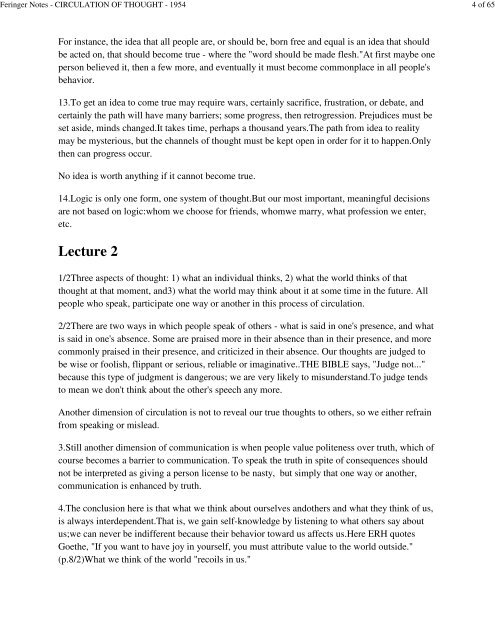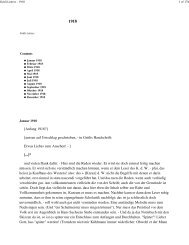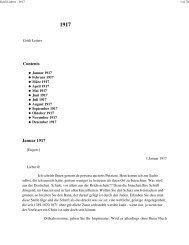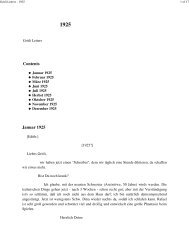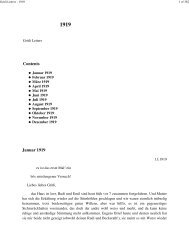Download pdf file - Eugen Rosenstock-Huessy
Download pdf file - Eugen Rosenstock-Huessy
Download pdf file - Eugen Rosenstock-Huessy
Create successful ePaper yourself
Turn your PDF publications into a flip-book with our unique Google optimized e-Paper software.
Feringer Notes - CIRCULATION OF THOUGHT - 1954 4 of 65<br />
For instance, the idea that all people are, or should be, born free and equal is an idea that should<br />
be acted on, that should become true - where the "word should be made flesh."At first maybe one<br />
person believed it, then a few more, and eventually it must become commonplace in all people's<br />
behavior.<br />
13.To get an idea to come true may require wars, certainly sacrifice, frustration, or debate, and<br />
certainly the path will have many barriers; some progress, then retrogression. Prejudices must be<br />
set aside, minds changed.It takes time, perhaps a thousand years.The path from idea to reality<br />
may be mysterious, but the channels of thought must be kept open in order for it to happen.Only<br />
then can progress occur.<br />
No idea is worth anything if it cannot become true.<br />
14.Logic is only one form, one system of thought.But our most important, meaningful decisions<br />
are not based on logic:whom we choose for friends, whomwe marry, what profession we enter,<br />
etc.<br />
Lecture 2<br />
1/2Three aspects of thought: 1) what an individual thinks, 2) what the world thinks of that<br />
thought at that moment, and3) what the world may think about it at some time in the future. All<br />
people who speak, participate one way or another in this process of circulation.<br />
2/2There are two ways in which people speak of others - what is said in one's presence, and what<br />
is said in one's absence. Some are praised more in their absence than in their presence, and more<br />
commonly praised in their presence, and criticized in their absence. Our thoughts are judged to<br />
be wise or foolish, flippant or serious, reliable or imaginative..THE BIBLE says, "Judge not..."<br />
because this type of judgment is dangerous; we are very likely to misunderstand.To judge tends<br />
to mean we don't think about the other's speech any more.<br />
Another dimension of circulation is not to reveal our true thoughts to others, so we either refrain<br />
from speaking or mislead.<br />
3.Still another dimension of communication is when people value politeness over truth, which of<br />
course becomes a barrier to communication. To speak the truth in spite of consequences should<br />
not be interpreted as giving a person license to be nasty, but simply that one way or another,<br />
communication is enhanced by truth.<br />
4.The conclusion here is that what we think about ourselves andothers and what they think of us,<br />
is always interdependent.That is, we gain self-knowledge by listening to what others say about<br />
us;we can never be indifferent because their behavior toward us affects us.Here ERH quotes<br />
Goethe, "If you want to have joy in yourself, you must attribute value to the world outside."<br />
(p.8/2)What we think of the world "recoils in us."


